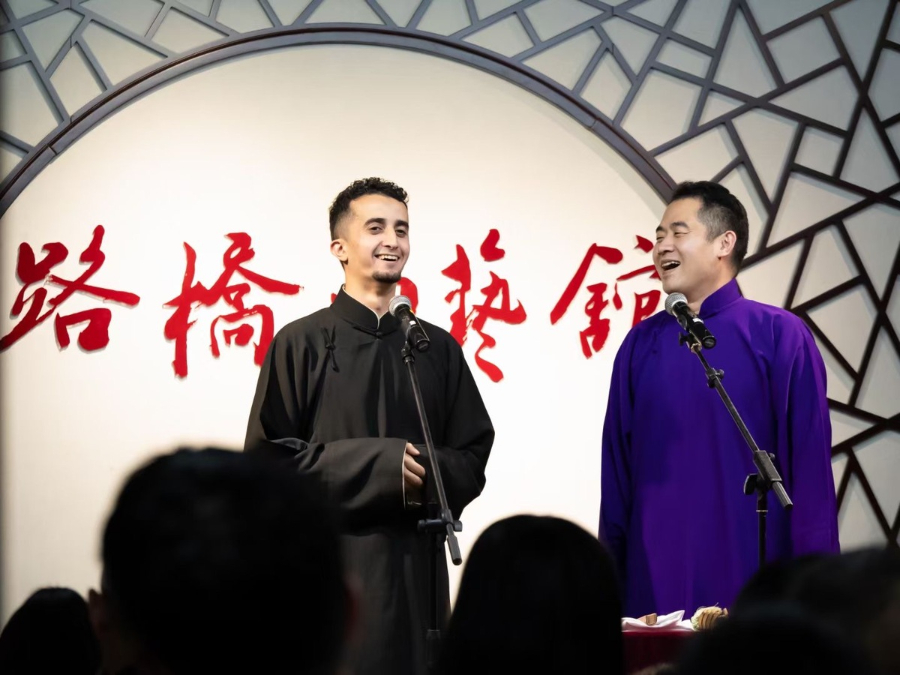Talk of the town
On the street in Hangzhou, the capital of East China's Zhejiang province, many pedestrians turned to the foreigner in surprise as he started speaking fluently and rapidly: he was practicing local Chinese tongue twisters, with each repetition louder and louder.
It was a common encounter with Musab Al Rudaisat, 30, an Arab apprentice of Chinese cross-talk or xiangsheng, the traditional comedic act that can be performed in a dialogue between two performers or as a solo monologue.
Musab grew up in Jordan and is a graduating medical PhD student at Zhejiang University in Hangzhou. He came to China to pursue his studies in 2011 and has spent most of his time in the country since. Musab has been one of the leading comedians in the city's Kailehui Cross-talk Club for five years. The club performs traditional cross-talk comedy shows at multiple locations throughout the city.
Xiangsheng can be traced to the Ming Dynasty (1368-1644) and can comprise a lead speaker (dougen) who delivers punchlines and jokes and a supportive role (penggen) who reacts to the lead speaker's words. Unlike Western stand-up comedy, which often relies on disconnected one-liners and random stories, Chinese cross-talk presents a coherent, developing storyline with a beginning and end. It also incorporates linguistic devices such as puns, cultural references, dialect usage and other language-based humor, reflecting Chinese history and everyday life.
Motivated by his enthusiasm for understanding Chinese culture and the language, Musab watched countless Chinese reality shows to practice his Mandarin skills.
Journey to fluency
"My interest in learning Chinese began when I was still in Jordan," Musab said. When he arrived in China for his studies, he soon began to practice his Chinese speaking skills whenever he had the chance.
"Although I spend most of my weekdays in and outside the hospital and medical school, I would try to speak and practice simple, mundane Chinese vocabulary everywhere, like in the supermarkets, on public transportation or inside my dorm room with my Chinese roommates," Musab said, adding that he acquired online dictionaries and listened to his recordings to establish his linguistic intuition and learn Chinese dialect phrases.
Deciding to improve his Chinese skills further and deepen his knowledge of Chinese culture, Musab joined the Kailehui Cross-talk Club in 2018. He often practiced pronouncing vocabulary, short phrases and sentences before sending recordings to his Chinese partners and teachers to seek corrections and ideas for improvements, even very late at night.
"Musab is among the most hardworking apprentices I've had; among about 200 students I've interacted with. He would practice the pronunciations until midnight, and I would receive his WeChat messages around 2 or 3 am asking me to rate and correct these pronunciations," said Musab's master and teacher, Bo Kaiwen, 35.
In line with traditional Chinese values that emphasize the close teacher-student and master-apprentice relationship to pass on their knowledge and skills fully, Bo recalled being strict with Musab on several occasions.
"I made him cry once because he was responsible for an error, which was honestly just a minor mistake in spelling when announcing the contents on stage; as soon as he got backstage, I lectured and criticized him," Bo said, expressing the belief that only by treating everyone in the cross-talk profession equally, regardless of appearance or background, can the students understand and meet the requisite skills and standards.
"Hard work always pays off, and now Musab is comfortable showing himself on stage," Bo said.
"Musab is a great comedian; he saved our comedy show once. Since then, he has transcended his identities in our club," Liu Zhendong said, describing how Musab's calm and collected demeanor had prevented a "potentially disastrous outcome".
"I forgot my lines, and the entire audience sunk into an awkward silence for a couple of seconds, but fortunately, Musab's solid fundamentals and flexibility in his understanding of cross-talk reignited the atmosphere," he said. "The audience didn't even notice my mistake," Liu said.
From then on, Liu and the others in the cross-talk club no longer viewed Musab as a "foreign practitioner"; instead, Liu said: "We removed the 'foreign' label and started viewing him just like every other fellow comedian here. As his partner, I hope he can continue to be a qualified Chinese cross-talk comedian, accepted and understood by all."

Cross-talker Musab and his partner Liu Zhendong perform in the Taizhou Luqiao folk art hall, Zhejiang province, in June 2023. [Photo provided to China Daily]
Looking abroad
A popular comedian representing his comedy club and nation in his life, interviews and documentaries, Musab's remarkable journey is a testament to the power of his perseverance in overcoming language barriers and fostering cross-cultural understanding, they said.
Musab said that he is planning a trip back home after pandemic travel restrictions had separated him and his family in Jordan for almost four years.
But he will continue his cross-talk career, he said.
"I would love to keep performing in Jordan or China; I would also love to introduce xiangsheng to more Jordanians and Arabs, for them to learn xiangsheng and its theatrical, artistic aspects," Musab said.
"Musab is going to make it happen, I am sure," Bo said.
"I truly hope that with my efforts, more foreigners would be inspired and get to know Chinese culture through xiangsheng and use it as an interesting, humorous tool to uncover, research and fall in love with Chinese culture," Musab said.


